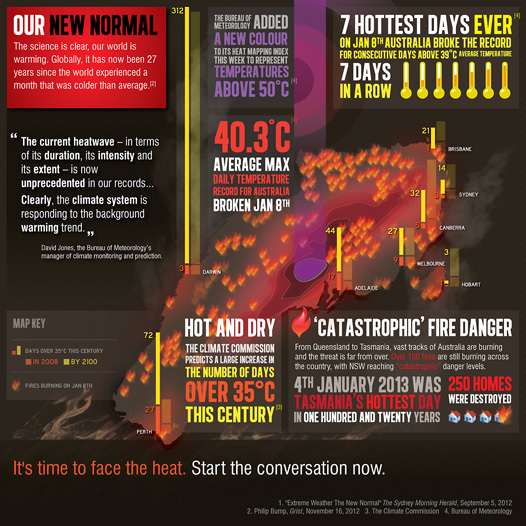
This infographic comes from Get Up Australia and is from here. For a printable version.
For powerful images from the #BigAussieHeat, see: Grandparents save five kids from ‘tornadoes of fire’ in Australia; pics
- The hottest average maximum temperature ever recorded across Australia – 40.33 degrees, was set on Monday surpassing the old record of 40.17 °C set in 1976. (Bureau of Meteorology)
- The number of consecutive days where the national average maximum daily temperature exceeded 39°C has also been broken this week—seven (7) days (between 2–8 January 2013), almost doubling the previous record of four (4) consecutive days in 1973, (BOM)
- According to the National Climate Data Centre, nine of the 10 hottest years on record have been since 2000 (the other is 1998).
- While temperatures vary on a local and regional scale, globally it has now been 27 years since the world experienced a month that was colder than average. "If you’re 27 or younger, you’ve never experienced a colder-than-average month" - Philip Bump, Grist, November 16, 2012.
- The CSIRO has found Australian annual average daily maximum temperatures have steadily increased in the last hundred years, with most of the warming trend occurring since 1970.
- The Bushfire CRC (Cooperative Research Centre) says large areas of southern Australia, from the east coast to the west coast, face “above average fire potential” in the summer of 2012-13. According to the Climate Institute extreme fire danger days are expected to rise more than 15 per cent in south-eastern Australia.
- The last four months of 2012 - globally - were the hottest on record. (British Met Office) and 2012 was the hottest year the continental United States of America has ever recorded.("2012 Was the Hottest Year in U.S. History. And Yes - It's Climate Change", Bryan Walsh, TIME 8 January, 2013).
- The hot-dry trend is expected to continue, with the Climate Commission predicting large increases in the number of days over 35°C this century.
- Around the world, 2013 could be the hottest ever recorded by modern instrumentation, according to a recent study by Britain’s Met Office. If that turns out to be accurate, 2013 would surpass the previous record, held jointly by 2005 and 2010.
Comments
Most definitely something happening
I don't know about the U.S. as a whole, but here in central Illinois we set all kinds of records last year, esp. in July. During that month, we had only about half an inch of rain, and all but 2 days got into the 90s (with about 10 days over 100). The whole summer was sorta like that. Oh, and that had been preceded (in late '11 and early '12) by one of the driest and warmest winters on record here. We had right at a foot of snow for the whole season. And now? So far this winter, we've had a grand total of 2".
(And now of course I've probably jinxed it... and we'll be seeing the blizzard of the century any day now!)
As for US as a whole, 2012 was hottest year ever recorded ...
Anda year of major extreme weather events and ...
See, The numbers are in … and they’re hot (2012 US Climate conditions) (http://getenergysmartnow.com/2013/01/08/the-numbers-are-in-and-theyre-ho...)